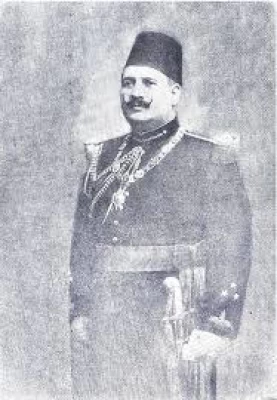
Fuad I/ Ahmed Fouad Pasha
Fuad I was the ruler of Egypt from 1917 to 1922. After Egypt declared independence on March 15, 1922, he changed his title to King of Egypt. He was born Ahmed Fuad, the son of Ismail Pasha, in Giza. He was educated at a special school in Abdeen Palace and excelled in his studies. He went into exile with his father in Italy after his father was removed from power in 1879.
Fuad Pasha was a proud servant of Sultan Abdul Hamid II and later appointed as a military attaché for the embassy of the Ottoman Empire in Vienna. Upon his return to Egypt in 1890, he became the head of the royal servants during the reign of Khedive Abbas Helmi II. He continued to advance in this position until he became the chief servant of the Khedive for three consecutive years. He was also involved in cultural affairs and led the committee that established and organized the Egyptian University. Fuad Pasha was instrumental in founding the Egyptian University, which was only a dream until he brought it to fruition and celebrated its opening on December 21, 1908.
He also founded the Royal Society for Economics, Statistics, and Legislation, inaugurating it with a celebration on April 8, 1909. This society hosted many lectures and beneficial discussions. On January 5, 1910, he was elected as the president of the Red Crescent Association in Cairo. On February 6, 1915, he took over his brother's position as the president of the Belgian Coastal Railway Company. And on March 2, 1916, he led the Red Crescent Society in Egypt.
During his reign, there was a revolution in 1919 which forced the British to end their control over Egypt and recognize it as an independent kingdom. Egypt declared its independence on March 15, 1922, and the king ordered the government to create a constitution that would allow the country to achieve its goals through cooperation between the people and the government. He also established the principle of ministerial responsibility.
In April 13, 1922, a law was passed regarding the inheritance of the throne in the family of Muhammad Ali. The first popular government was formed under the leadership of Saad Zaghloul in January 1924. In the summer of 1936, a treaty was signed between Egypt and the United Kingdom, in which the UK recognized Egypt as an independent state. In May of 1898, a prince named Ahmed Seif El Din shot another prince in a club because of a disagreement with his wife. The victim's sister, Princess Shweikar Khanum, asked her brother Ahmed Seif El Din to help, and he shot the victim. The victim survived but had some problems with his throat and his voice became louder.














